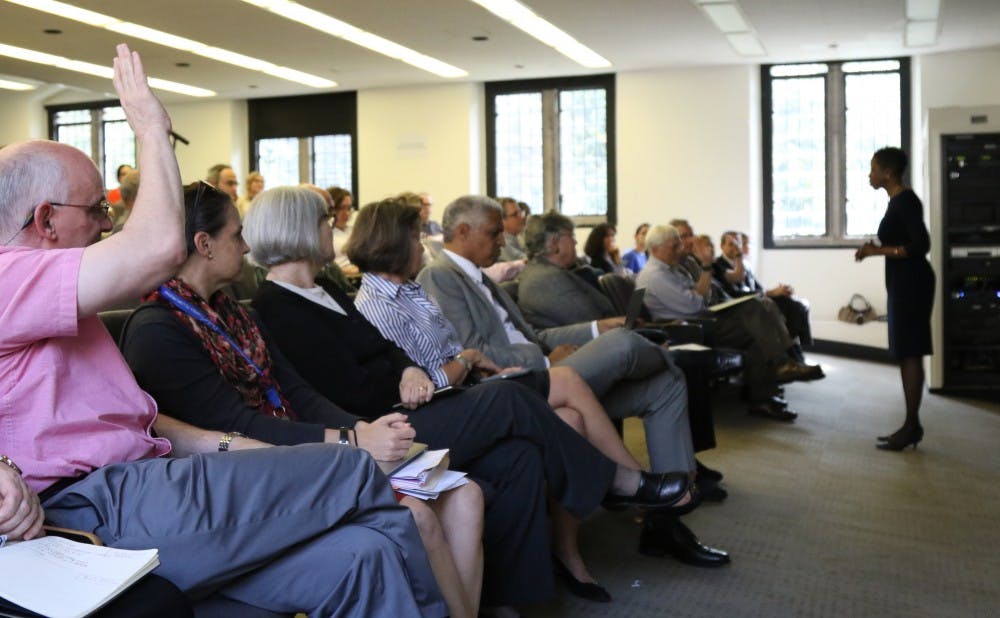At its first meeting of the year, the Arts and Sciences Council pledged to continue reviewing curriculum reforms, but without a clearly-defined deadline.
Anita Layton, chair of the Council and Robert R. and Katherine B. Penn professor of mathematics, thanked Paul Manos, outgoing chair for the courses committee and Jack H. Neely professor of biology, as well as David Malone, outgoing chair for the curriculum committee and professor of the practice of education, for their hours of service. She welcomed Susan Wynn, associate professor of the practice of education, and Jeff Forbes, associate professor of the practice of computer science, as the new chairs of each respective committee.
Valerie Ashby, dean of the Trinity College of Arts and Sciences, welcomed back Council members and opened by reiterating the three pillars of the Council’s mission—to advance excellence in research, teaching and service, to elevate leadership and mentoring among all faculty ranks and to foster diversity as the basis for creativity and excellence.
“Leadership and mentoring equals excellence, diversity equals excellence and you can’t do one of these without the other,” Ashby said.
She pointed to some of the University's successes from the past year on this front, including an undergraduate Class of 2021 that is more diverse than ever before. There are 29 percent more Latino students this year compared to last year, as well as more African American and Native American students than ever before, she said.
Switching to changes in faculty, Ashby said that Duke added 30 new positions this academic year—up from 18 new hires in the 2016-17 academic year. She also celebrated the accomplishments of Duke faculty in the 2017 calendar year, who collectively won 15 science research prizes, staged three international art exhibitions, published 71 scholarly books and earned 15 nationally competitive fellowships. Of particular significance, Michael Tomasello, James F. Bonk professor of psychology and neuroscience, was elected to the National Academy of Sciences, Duke's eighth awardee.
She also announced the return of Harris Cooper, Hugo L. Blomquist professor of psychology and neuroscience, as dean of social sciences in that role for one year. He will helm efforts to enhance Duke’s social sciences program, she noted.
“We are leading in the humanities nationally, and internationally. In the social sciences we’ve moved forward, also but we haven’t actually developed [these] sciences as fully, certainly not as much as we have in the humanities,” Ashby said. “We will not slip in our leadership in the humanities and in the social sciences.”
Gennifer Weisenfeld, dean of the humanities and professor of art, art history and visual studies has assembled a humanities team that meets on a regular basis to study and add structure to students’ pathways through the humanities, Ashby explained. To address concerns of financial sustainability, Weisenfeld has also begun fundraising work with organizations such as the Mellon Foundation.
A Trinity leadership development program has also been developed. As part of the new program, department chairs within Trinity will work to identify faculty within their departments who possess leadership potential. The program will take a cohort of 20 faculty per year.
Curriculum reform
Members of the Council said that they would continue to review and consider newer approaches to curriculum reform.
“You noted—everybody noted—that we paused last year. I actually think we stopped last year,” Ashby said. “What I seek this year—and I love a pause because it allows us to reset—is a partnership with our office but also with [the Executive Committee of the Arts and Sciences Council], with the [directors of undergraduate studies], with the [department] chairs, with the faculty more broadly," she said.
ECASC would “go wherever you want us to go”, Layton added, noting that she welcomes ideas from members of the Council.
She said that whatever direction the Council eventually decides to take will be faculty-driven, and consensus in multiple directions would be sought so that small programs are not neglected.
“We are not gearing up for curriculum reform take two,” Layton said. “There seems to be few reasons to wave a banner to say 'We are doing curriculum reform,' because statements like that put pressure on us and an expectation of a timeline. We see no upside to forcing us into a rigid timeline—we’re not going to do that. Instead we are going to chill.”
Layton said that there was a possibility of sending out faculty-wide surveys—which would subsequently become publicly available to all members of the Council with full transparency—to solicit recommendations. There might also be value in holding follow-up town hall discussions, she added, although it remained uncertain what format would be most effective and who should host these meetings.
In other business:
Minutes from the Council's meeting on March 9 were approved by the Council unanimously.
The Council also moved to include the dean of the Pratt School of Engineering to the membership of the global education committee. Layton noted that the Global Education Office serves all undergraduates, and although it already informally reports to both Trinity and Pratt, the council’s bylaws needed to be revised to reflect current practices.
Layton tabled the issue of permitting Council members and their alternates to vote via email in the event that departments could not physically send representatives to key meetings. Several faculty members voiced objections to this proposal, however.
Alex Rosenberg, R. Taylor Cole professor of philosophy, noted that this would reduce Council members’ motivation to attend meetings. He added that without hearing the group's discussion, physically absent Council members would be casting votes relatively uninformed.
Layton suggested that the issue be re-tabled in next month’s meeting.
Get The Chronicle straight to your inbox
Signup for our weekly newsletter. Cancel at any time.

